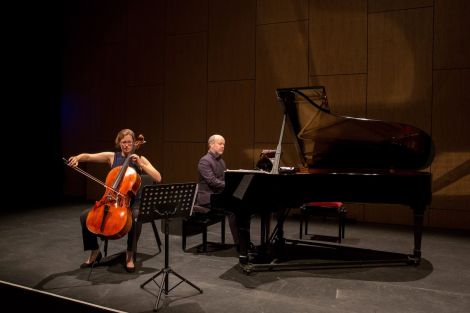Reviews / ‘A rich and unbelievably satisfying experience’
Shetland Arts’ 2017-18 Classical Season looked to be off to a flying start on Thursday night, with a packed auditorium, an excited audience, and a buzzing atmosphere, writes Alex Garrick-Wright. Then again, with the opening concert being two world-class, local musicians – playing together on home turf for the first time – the excitement was perhaps predictable.
In Our Homeland, a concert about regional and national identity, was named both for the Edvard Grieg piece that opened the show, but also for the two Shetland musicians – Neil Georgeson and Abby Hayward – who were playing to a local audience.
Neil is no stranger to Shetland’s classical fans, having been instrumental in last year’s season of concerts, which managed to be uniformly brilliant and unusual. He was joined by the accomplished cellist Abby Hayward – to see them both performing in Shetland promised quite a treat.
“It’s fine to see so many of you here,” Neil said, “for what feels like a special event.”
The concert opened with In My Homeland by Grieg, a composer whose exploration of his national musical culture made him one of Norway’s greatest musical heroes. This light and gentle piece was followed by the much faster and dramatic National Song, which in turn was followed up by the playful Norwegian Dance, which sounded very much like the soundtrack to a silent Charlie Chaplin film.
Three Hardanger fiddle tunes, arranged for piano by Grieg and re-arranged for piano and cello by Neil, benefitted from the addition of string, somehow bringing them closer to their roots. Light and pastoral, and rich and vibrant in turn, they ended on a masterful flourish from both performers.
This was followed by Djilile, a piece by Australian composer Peter Sculthorpe which was based on indigenous tunes; “a gesture of trying to understand and embody” the native Australian culture. Slow and wistful, Djilile made the cello and piano seem to weep the whole way through. A moving and tremendously sad piece.
Become a member of Shetland News
Neil played three Chopin pieces as the only solos of the night – three pieces, he said, “that couldn’t have been more Polish.”
The first, Polonaise, was a martial, confident piece, constantly seeming to build on itself. Following this was the thoughtful, almost-but-not-quite-sad Mazurka, and the flurry of notes titled Revolutionary.
A constant turmoil of notes seemed to fight against the distinct melody that was crying out to be heard, in a fitting metaphor for the 1830 Polish Uprising that inspired the piece. A defiant number that ended with hands smashing down on the keys, Revolutionary was incredibly well-received.
“Where to start with Webern?” Abby asked. “What we are about to play is his entire output for cello and piano.”
Austrian composer Anton Webern’s entire works for the two instruments comes to around 9 minutes – some were as short as 20 seconds. Dreamlike and sometimes dissonant, one piece actually sounded like an argument between cello and piano (with the cello winning), while another was eerie and unhinged, like the ravings of a madman.
Schumann’s Drei Fantasiestücke ended the first half, a rich and evocative showcase of both Abby and Neil’s talents that wandered between moods and ending on a big finish that earned its sustained and wild applause.
Estonian composer Arvo Pärt’s Fratres resumed the concert with an ethereal cello, and a tense, slow piano that periodically was crashed down upon startlingly. Dramatic and enthralling, it ended on a long, low reverberation, then a moment’s silence, broken by whoops and cheers from the appreciative audience.
Apartment House Harmonies, extracts from John Cage’s US Bicentennial celebratory work, was the strange, experimental piece that audiences have come to expect from Neil’s concerts. He explained that the Harmonies were created by Cage removing notes from old Colonial-era hymns – a statement which drew some laughter.
“It is, I suppose, kind of funny,” Neil remarked.
Soon after it began, the audience realised in tandem what this meant, triggering more laughter. Neil and Abby would play for a few seconds, then freeze – like a game of literal musical statues – counting in their heads until they could resume for but a few notes. A bizarre spectacle.
The gaps made it impossible to discern what the underlying tune was like, the ambient noise of the audience becoming, in a way, part of the performance. The effect made its mark, but after seven such pieces, their welcome seemed to have run out.
Brahms’ Sonata for Cello and Piano was relatively relaxed piece, with a drastic change in the final movement – frantic and dramatic, with never more than a moment’s respite for the performers. It ended to overwhelming applause.
There was no chance that Neil and Abby were escaping without an encore, and so they swiftly returned for Rachmaninoff’s Vocalise, a slow, gentle and slightly sombre number, presumably to calm everyone down after the explosive end of Sonata.
That Neil and Abby have never played together before is a crime. Each was perfectly attuned to the other, their individual talents complementing and augmenting the other, in a rich and unbelievably satisfying experience. Thursday night’s audience surely went home hoping that Neil and Abby decide to play in their homeland once again.
Become a member of Shetland News
Shetland News is asking its many readers to consider paying for membership to get additional features and services: -
- Remove non-local ads;
- Bookmark posts to read later;
- Exclusive curated weekly newsletter;
- Hide membership messages;
- Comments open for discussion.
If you appreciate what we do and feel strongly about impartial local journalism, then please become a member of Shetland News by either making a single payment, or setting up a monthly, quarterly or yearly subscription.


























































